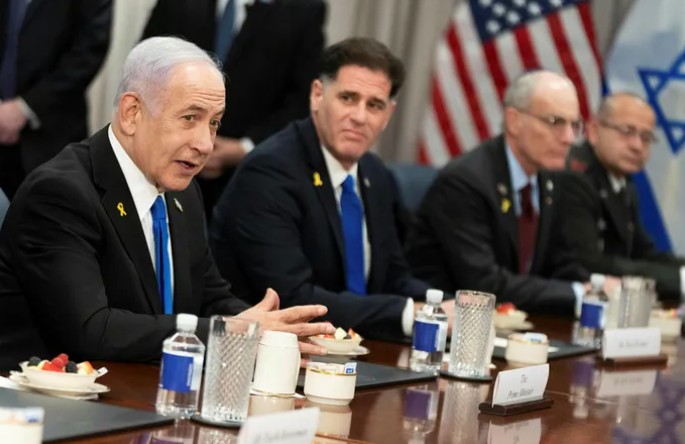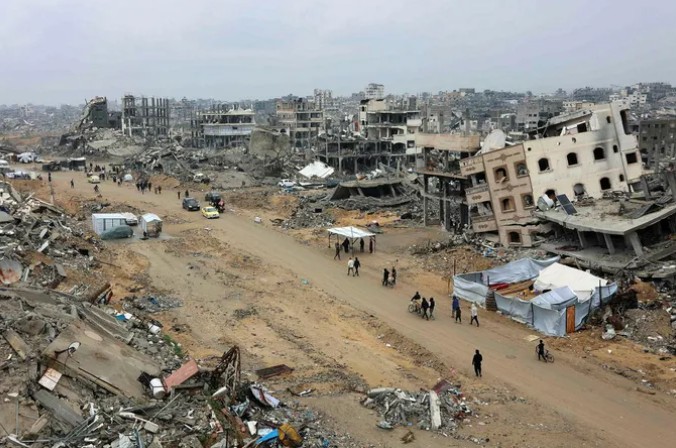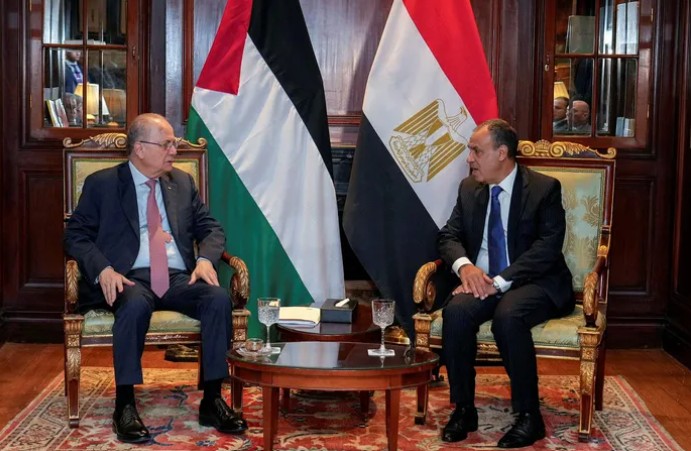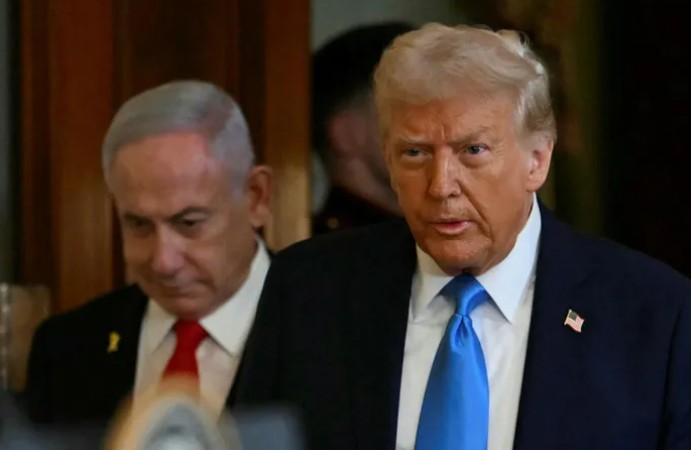With a few smug and self-assured words, U.S. President Donald Trump thrust the Israeli-Palestinian conflict back into the heart of international discourse, pulling the Gaza Strip out of the "humanitarian disaster" category and turning it into a symbol of national "steadfastness."
In doing so, he fostered a new sense of Arab unity – not just to defend the Palestinians, but primarily to shield Arab states from the conflict spilling over into their territory.

Until now, Middle Eastern countries have been classified by their geopolitical alignment – the moderate Sunni axis, the pro-U.S. axis, the Shiite axis or the so-called "Iranian axis of evil." On Tuesday, Trump introduced a new one: the axis of fear.
Less than an hour after Trump unveiled his transfer plan, in which he "revealed" that Saudi Arabia wasn't demanding the establishment of a Palestinian state, the Saudi Foreign Ministry, on behalf of Crown Prince Mohammed bin Salman, swiftly issued a sharp and unequivocal response.
It stated that diplomatic relations with Israel, or a normalization deal, wouldn't happen without the establishment of a Palestinian state. According to the statement, this is a firm position that wouldn't be open to negotiation.
Shortly afterward, a flurry of phone calls took place between regional leaders. Palestinian President Mahmoud Abbas flew to meet with Jordan's King Abdullah, who sees the plan as an existential threat to his country, to coordinate their positions ahead of the king's meeting with Trump the following Tuesday.
Turkish Foreign Minister Hakan Fidan stated that Trump's plan to expel some two million Palestinians is "unacceptable." In the coming days, an Arab summit is expected to convene to once again take a firm stand against what is being called the "forced migration" of Gazans.
It'll also set the stage for a potential Arab-American summit, which, according to Arab sources, could take place as early as the end of the month in Saudi Arabia with Trump's participation.

Trump's plan assumes that the Palestinians, without being consulted, will eagerly embrace the opportunity of a lifetime – offered a villa with a golf course and swimming pool in the Sinai desert. At the same time, it ensnares the leaders of neighboring countries, not just Egypt and Jordan, in a dilemma fraught with threats.
The permanent resettlement of approximately two million Palestinian refugees means transferring the so-called Palestinian issue to their territories, along with the national, security, economic and social implications that come with it – both at the state level and at the broader Arab level.
For Jordan, where two-thirds of citizens are Palestinians, the migration of hundreds of thousands of additional Palestinians represents a demographic earthquake that could trigger an internal upheaval, potentially ending the reign of the Hashemite dynasty.
The kingdom still vividly recalls the events of Black September in 1970 – the bloody conflict that threatened King Hussein's rule and life. Only after a fierce struggle was the king able to expel the PLO from Jordan.
Even now, although Palestinians from the West Bank hold Jordanian citizenship and "Jordanian Palestinians" – those born and raised in Jordan – occupy some of the highest positions, the Palestinian community in the kingdom is still regarded as a "suspicious element."
Jordan does permit the political activities of the Muslim Brotherhood, whose representatives are also members of parliament, but it bans Hamas and doesn't allow even family visits for its leaders .
The resettlement of hundreds of thousands of Gazans - many with ties to - Hamas, could destabilize Jordan and lead to conflict with Israel, resembling the situation in the 1960s and 1970s. It could also mirror Lebanon, where the second wave of Palestinian refugees in the 1970s created the ongoing threat known as "Fatahland."
This threat didn't end with the First Lebanon War, and large amounts of weaponry in the Palestinian refugee camps – from which sporadic attacks against Israel also emerged – are worth remembering. It's also worth noting that Hamas established training bases in Lebanon and one of its strongest political offices. Is this the direction Trump envisions when he proposes Jordan as a refuge for Gazans?
Egypt could face a similar development, where its long and ongoing war against Islamist terrorist groups and the Muslim Brotherhood will be further complicated by the arrival of thousands of Hamas members in Sinai – an area where controlling and monitoring the flow of weapons and ammunition is an almost impossible challenge.
The economic burden Egypt would face would be a secondary concern, compared to the direct connection likely to form between Hamas and the Muslim Brotherhood. This partnership could lead to the creation of a skilled and experienced military wing that would pose a threat to both Egypt and Israel. Like Jordan, Egypt could risk becoming a state of conflict.

When Trump's planned 'Middle Eastern Riviera' and the manufacturing facilities to be built in Gaza rise before the eyes of hundreds of thousands of Gazans, whose homes will be replaced by vacation sites, they'll have to live under this very real threat. It seems that this rosy dream will quickly turn into a nightmare.
The effort to thwart the threat posed by the transfer of the Israeli-Palestinian conflict to their territories, however, places Jordan and Egypt under Trump's looming gaze, as he presents them with an economic ultimatum. Egypt and Jordan, key players in the pro-Western and especially pro-U.S. axis, heavily depend on U.S. economic aid, which goes beyond just the nominal amounts they receive.
This steady aid also functions as political support, serving as a crucial guarantee for obtaining loans from international financial institutions like the International Monetary Fund. Additionally, it secures favorable trade agreements, military assistance and the protection the United States extends to both countries.
However, these countries also receive generous aid from the Gulf states, particularly Saudi Arabia and the United Arab Emirates. In the past year alone, both nations invested tens of billions of dollars in Egypt and millions in Jordan.
Theoretically, if Saudi Arabia chooses to thwart Trump's threat and protect its "sisters" from his pressure, it could step in financially, effectively replacing the United States at a significantly lower cost than what would be required to build Trump's envisioned so-called riviera in Gaza.
Moreover, Saudi Arabia announced two weeks ago that it plans to invest approximately $600 billion in the United States over the next four years of Trump's presidency. Trump, confident he can extract even a trillion dollars from Crown Prince Salman, will need to evaluate who holds the greater economic leverage.
None of these countries, however, wants a confrontation with the United States, just as Trump is unlikely to forgo the economic benefits Saudi Arabia offers him, nor the normalization he seeks between the Saudis and Israel.

Given Saudi Arabia's current resolute stance, the overwhelming opposition from the "hosting countries" and other regional states, as well as the criticism emerging from Congress regarding the transfer plan, Trump will likely have to adopt a new set of priorities.
Even the normalization may have to wait until a sufficiently complex solution for Palestinian statehood is found – one that satisfies Saudi Arabia while maintaining the integrity of Netanyahu's coalition.
It may be best for now not to hold one's breath waiting for the statement about the annexation of the West Bank to Israel, which Trump promised to make within four weeks.
The failure to annex in the previous round served the UAE as justification for signing the peace agreement with Israel, and this can be repeated with Saudi Arabia, along with an American, not Israeli, promise of the Palestinians' right to a state.
Until then, it's wise to adopt the measured approach of the Qatari prime minister, who refrained from commenting on the Gaza transfer plan and suggested focusing on completing the hostage deal first.


Spread the word